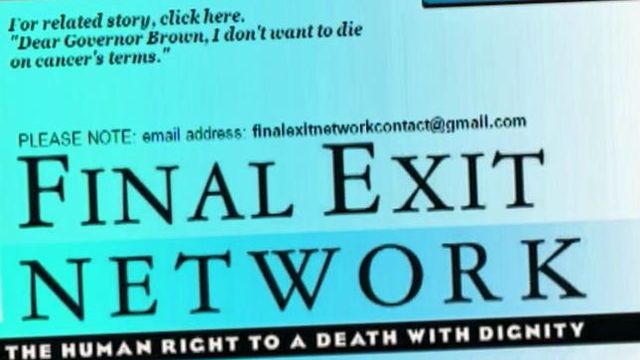Chapel Hill woman: 'I will never leave you until you're dead'
Fran Schindler talks about death as if it's a normal, everyday topic. As a former psychiatric nurse, she has watched people die. Now as an "exit guide," the Chapel Hill woman helps mentally competent, terminally ill people end their lives.
Posted — UpdatedThere’s also debate over what to call the issue – aid-in-dying, death with dignity, euthanasia, assisted suicide. No matter what it’s called, Schindler says her job is to provide education, information and compassionate support to people who meet the organization’s medical criteria to take their own lives.
Oftentimes, people with ALS, cancer or Parkinson's disease who no longer want to suffer call the group for help.
“We visit the person. We talk to them about the kinds of materials they will need. We will show them how to use them, talk to them about how to get them,” Schindler said. “I will (assess if) they are mentally competent and physically able to carry this out themselves.”
Schindler makes it clear she does not administer or inject anything lethal in any way. She says people who are dying from an illness want the option with the least amount of pain, and she believes telling them how to do it is not a crime.
“That’s education. They have a right to that information,” she said. “I have the First Amendment right, I hope, to still speak openly with people about whatever we want to talk about.”
Since 2007, Schindler has sat beside 35 people in various states who ended their lives using the information she gave them. Three were from North Carolina. Each year, the organization helps about 25 people take their lives.
People who contact Final Exit Network have to submit medical records, send a letter of intent detailing why their life is intolerable and why they want to end their life and do a phone interview with someone from the organization.
A medical evaluation committee of three physicians, one of whom is a psychiatrist, examine the records and the person’s diagnosis. If the committee says the person is eligible, two guides are then assigned to the case.
“They obtain their equipment, and after we make that visit, it’s up to them to call us if and when they decide to exit,” Schindler said. “Some people go through that whole process. We visit them once. We’ll never hear from them again. And we don’t call people to say, ‘Where are you? Are you still wanting to end your life?’ We don’t do that.”
“The whole thing is their choice,” she added. “They are continually asked, ‘What is going to happen to you when you carry this out?’ And they’d better be able to tell me that when they pull this hood down over their head and breathe the inner gas, which is our method of choice, they will be dead.”
If the person says yes, Schindler sits nearby and watches, sometimes with the person’s family and friends.
“They will die peacefully,” she said. “No pain. They are unconscious within 5 to 10 seconds. That’s all they know.”
Schindler says she doesn’t have a hard time watching death.
“My background is nursing. I’ve seen people die. I’ve seen my mom die, not well, of dementia in a nursing home,” she said. “I would much rather see people peacefully die through their own choice than to suffer through pain and a long tragic path to be dead.”
The former psychiatric nurse, mother of three and grandmother says Final Exit Network gives her peace of mind, knowing she can choose a way out if her health ever took a sharp turn. Until that day comes, she'll spend her days helping others find their peace.
“I feel at peace because they are at peace. They’ve gotten what they wanted. Essentially, I showed up and validated their choice, witnessed their choice,” she said. “I believe people should not have to die alone.”
Many religious groups oppose aid-in-dying legislation, saying it goes against the will of God. The North Carolina Medical Society and North Carolina Right to Life both oppose physician-assisted suicide, saying it makes the elderly and the ill vulnerable.
Schindler says the majority of people who contact Final Exit Network are highly educated and have no religious affiliation – many are atheist or agnostic.
“They tend to be people with what I call a very high internal locus of control. They do not let outside influences control the decisions they make in their lives,” she said. “They are people who have controlled their lives forever, and they intend to control their death.”
• Credits
Copyright 2024 by Capitol Broadcasting Company. All rights reserved. This material may not be published, broadcast, rewritten or redistributed.





